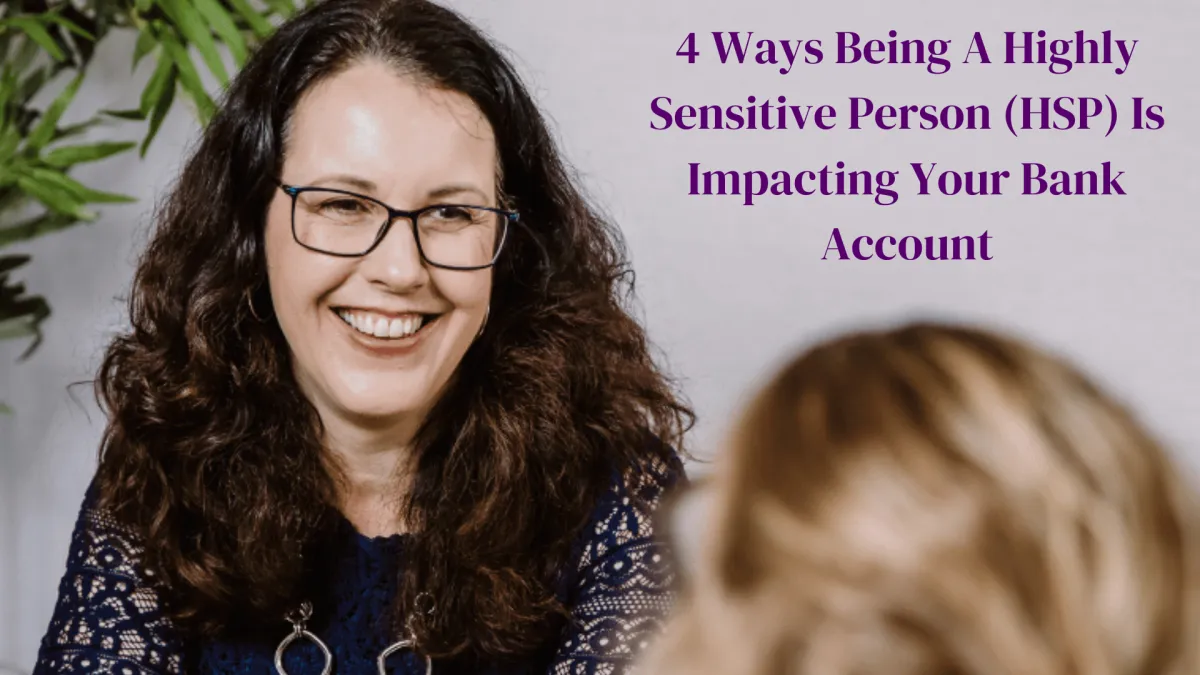How Does Financial Wounding And Trauma Occur?
Your relationship to money is established between the ages of 0-7 years old
It guides what consistent habits and behaviours you take to make money
It determines what goals you set and what you believe is possible
It contains your money stories, money blocks, beliefs, assumptions and vows
It determines how your body reacts to stress
Ultimately your Mindset determines how much money you will attract, receive and keep
In an ideal world everyone would develop an abundant mindset and be able to keep, receive and attract the money that they need and want, but for 48% of adults have experience an one or more Adverse Childhood Experience (ACE's) and that doesn't include the divorces, redundancies and other financial trauma's that adults face every day...
Which means that most of us have experienced some form of financial wounding or financial trauma
Sometimes, financial wounding can show up in sentences that begin with ‘I am …’, as you can see in this beautiful and eloquent video from Rikke Kjelgaard about how many of us struggle with these thoughts and feelings.
All of these statements impact our sense of power, possibility and potential when we come to take the actions needed to keep, attract and receive money
How Do You Know If You're Financially Wounded?
You'll say things like.....
" There's never enough money, time or energy "
" I don't have what it takes to be successful "
" I'm working really hard and getting nowhere "
" There's something wrong with me "
" I need other people to approve of me "
" I'm not good enough "
" I feel like I don't deserve anything good "
" I'm scared to go after what I want "
" I feel guilty or embarrassed about money "
" I should be better off by now "
Read More About Financial Wounding And Financial Trauma

4 Ways Being A HSP Is Impacting Your Bank Account
4 Ways Being A Highly Sensitive Person (HSP) Is Impacting Your Bank Account
In today's fast-paced, high-stress world, being a Highly Sensitive Person (HSP) can feel like both a blessing and a curse. On the one hand, heightened sensitivity can lead you to having deeper connections and greater empathy; on the other, it can result in you feeling overwhelmed, anxious, and stressed. But how does this unique trait that affects 30% of the population, impact your finances?
Here’s 4 ways that being an HSP can influence your money management, spending habits and willingness to make sales, and the strategies to harness your sensitivity to improve your bank account.
The Financial Challenges of Being an HSP
1. Impulse Spending as Emotional Relief
Highly sensitive people (HSP’s) often experience emotions more intensely than others, which means that their heightened emotional state can lead to impulse spending as a form of self-soothing. Whether it's splurging on a new gadget, new clothes, or comfort food, HSPs can find themselves spending money to alleviate stress or anxiety.
Strategy: Develop mindful spending habits. Before making a purchase, take a moment to think whether this purchase is a need or a want. Putting items in the shopping cart and then implementing a 24-hour rule before making non-essential purchases can help you manage those pesky feelings and help you stop overspending
2. Avoidance of Financial Management Due to Overwhelm
Financial tasks such as budgeting, investing, or even opening bills can feel overwhelming for HSPs, especially when money is tight but avoidance can lead to financial disorganization, missed payments, and unnecessary fees.
Strategy: Take 5 minutes to do some mindful breathing and destress before attempting any financial tasks such as checking your bank account. Break financial tasks into manageable chunks. Instead of tackling your entire budget in one sitting, allocate specific tasks to different days of the week. You can look at utilizing financial apps that can automate bill payments and track expenses, helping you to reduce your stress (personally I like old-fashioned Excel spreadsheets).
3. High Spending on Self-Care and Stress Relief
HSP’s have often grown up in families with no understanding of their trait. As such they may have been punished, criticised or judged harshly for being too sensitive. Many HSP’s also come from families which have undergone some form of trauma, whether that’s divorce, loss of a parent, poverty or mental illness, which they experience more deeply than others and which may have increased their sense of being ‘different’ to others. Many HSP’s can also have high ACE (Adverse Childhood Experience) scores without realising it - check your score here: https://www.mdcalc.com/calc/10464/adverse-childhood-experiences-ace-score
As a result HSPs may invest heavily in activities and products aimed at reducing stress and promoting well-being. While prioritizing self-care is crucial, it can sometimes lead to overspending on massages, therapy, retreats, or wellness products which fail to heal the underlying trauma
Strategy: Because of the lack of understanding about the HSP’s experience, HSP’s are often unaware of what is causing their experiences and so buy products rather than making use of free resources which they have access to. Free or low-cost stress-relief activities such as meditation, nature walks, or creative hobbies can be easily incorporated into a daily routine. Whilst professional help with trauma healing may also be needed. Having fun doesn’t require having a budget but the long term impact of trauma can make experiencing fun and joy difficult.
4. Being a HSP makes us empathetic but also poor
Being highly sensitive means that you feel your clients pain, deeply. You’ve probably been in your clients shoes and that’s why you’re so passionate about your business. And you know you’ve found the solution and you want to share it. That passion is good for your business but it has its drawbacks for your bank account
It feels so right to you to help others that it seems wrong to charge people for what you do. HSP’s cn often have other limiting beliefs about ‘its not spiritual to charge people’ or they may have a ‘rescue’ belief that keeps them earning ‘pocket money’ and unable to become the main breadwinner (even though many HSP’s really want this). This makes for weak boundaries, giving away time and effort for free and feeling uncomfortable when asking for money
Strategy: Learning how to self-regulate your emotions, will ensure you stay in your ‘lane’ rather than being overwhelmed by the other person’s pain. Recognising the value that being a HSP brings to your clients enables you to set boundaries and charge your worth
Being a Highly Sensitive Person undoubtedly impacts your relationship with money, bringing both challenges and advantages to you and your business. By understanding how your sensitivity influences your financial habits, you can develop strategies to mitigate the drawbacks and leverage your strengths.
Embrace your sensitivity as a unique asset, and with the right mindset, you can create a healthy and fulfilling financial life. Your sensitivity is not a weakness; it’s a powerful tool that, when harnessed correctly, can lead to a healthy bank account and lots more happy clients
I'm Carolyn Whitehouse, a HSP Money Psychologist, helping Highly Sensitive business owners to feel calm, confident and cpable with money. If you'd like to know more book a free 30min Curiosity Call with me and let's talk: https://serve.heartleader.uk/widget/bookings/30-min-curiosity-call
How Have I Been Financially Wounded?

It's hard to say how you've been financially wounded because:
It all feels very familiar, these feelings, beliefs, behaviours and perceptions have a long history
The feelings are resistant to change, you can’t talk yourself out of them and no amount of training, hard work and education fixes it
Part of you knows that your feelings are irrational but that doesn’t help
Sometimes it feels as though much younger parts of yourself are ‘driving the bus’ and pulling you in different directions
You keep doing the same unhelpful things, getting the same financial results
If some (or all) of this resonates with you, I might be able to help
You were born to succeed!
If we are loved, valued, and protected as children, we will thrive in all areas of our lives
And these feelings become the foundation of our money mindset
If those qualities are in short supply, we learn quickly to work hard to get what we need....NOT WHAT WE WANT
Even if we grow up in loving homes, we might still get the idea that there is something wrong with us or bad about us. You don’t have to have abusive parents to feel there's something missing but because we only have our own experience to go on, that's our "normal".
Unfortunately, when we grow older and start our own businesses, those same unconscious thoughts, feelings, and behaviours come with us, whether we need them or not.
Time won't heal the feelings
Eventually, we might realise that something is wrong, when we keep struggling to raise our prices, do our taxes or ask for money. Other people seem to be able to keep, attract or receive more money than we do, and we start to look for ways to feel better
.
When we read business or self-help books, we might be inspired, but nothing changes
Talking about our problems often makes us feel worse
We might understand logically what happened, but that doesn’t seem to help us change who we are or how we feel NOW.
If time hasn’t already healed what is troubling you, more time is probably not going to heal it either.
The way our brains and minds work means that our early financial wounding is likely to affect us financially for years to come. Our old emotional patterns will repeat themselves time after time. Our inner critics will never tire and shame never seems to go away.
That’s not your fault. That’s just what our brains and minds do
.
You have tried to soothe the symptoms. Using TV, social media, eating, drinking, shopping for marketing courses or business coaches, and all the other soothing possibilities we have. The symtoms go away for a while, but they always come back when the soothing wears off.
You could try to avoid the problem, but by doing that your business doesn't grow. If you don’t think about it perhaps it will go away, but everytime you look at your bank account, it's there. Everytime you know you should make a call to a potential client, its there.
To reduce that suffering, you must undo the way your mind and brain created those problems, or they will continue.
The only way to solve the problem is to heal the financial wounding
It's NOT Your Fault!
Many people find it difficult to admit to themselves and others that they are struggling with financial issues. They may even feel ashamed that they have these difficulties or even believe they deserve to suffer.
Feelings of guilt and shame can make it difficult for them to look for help and choose someone to trust with their distress.
Because financial wounding is so long-lasting and pervasive, many people believe there is nothing they can do to change them.
There are good reasons why these kinds of problems are so entrenched and difficult to change. They are part of our body’s and brain’s built-in response to stress.
It’s not our fault; it’s the way we work.
But new therapeutic approaches can help change those responses and ease those problems.
When we can heal this financial wounding/trauma, we can change for the better in ways that we might find hard to imagine.
Are You Ready To Change?
Power
Possibility
Potential



Discover your true power to change your financial health and wellbeing. Claim your self-worth as you meet your financial needs and transform your relationship with money
Discover what is truly possible for you once you release and resolve those life experiences that have overwhelmed, disappointed or hurt you
Feel your motivation, confidence, purpose and focus improve as you begin to build bigger dreams from your clarity, creativity and vision
What Other People Say...

"After the first couple of sessions (all on zoom) I felt a sense of peace and self acceptance that I hadn't for years. My habits and behaviour around money have positively improved but the biggest freedom I feel is a release from past trauma.
I highly recommend starting with a discovery chat with Carolyn - and if you feel the nudge to work with her, follow that instinct and know you will become better equipped with tools and habits to serve you going forward in life.." - Joanne

"I had an illuminating & fun EFT business session with Carolyn - it's amazing how 'simple words' can attach feelings to them that may interfere with our lives (not just in our business). Let's just say - the possibilities have now become a big green tick for the future! Thanks Carolyn." - Chloe

"After experiencing a traumatic incident of my own, Carolyn had me back in a calm and serene state, where I was able to easily control my own emotions again.
If you are someone who has experienced any kind of trauma in your life, I can wholeheartedly recommend Carolyn as the ‘go-to’ expert, who will help you overcome whatever it is you have experienced." - Phil
Carolyn Whitehouse - Financial Psychologist * Budgeting Coach* Speaker * Author
Carolyn Whitehouse is a Financial Psychologist, Budgeting Coach, Speaker and Author who supports ambitious and sensitive business owners to let go of self-doubt, charge their worth and release their fear of money. Carolyn’s heart-led approach combined with her unique Abundance Activator Framework, encourages her clients to discover their values, beliefs and stories around money, whilst releasing their financial wounds and trauma's. Drawing from personal money struggles when starting her own business, Carolyn combines her life-long passion for psychology and economics, with trauma-informed healing techniques, supporting clients in workshops, group programmes and working 1:1. She specialises in bringing order, balance and harmony to your bank account
Rewire Your Money, 17, Castledown Business Park, Tidworth Road, Lugershall, SP11 9AX, United Kingdom
Email: hello@carolynrwhitehouse.com
2024 Carolyn Whitehouse. All Rights Reserved. Do not duplicate or distribute without permission
